SONS OF DEWITT COLONY TEXAS
© 1997-2013, Wallace L. McKeehan, All Rights Reserved
Independence
Resolutions & Consultations-Index
3rd Texian Consultation, San Felipe de Austin, 1
November 1835
"Put off your shoes, for the ground upon which you
stand is holy. The rights and liberties of thousands of freemen are in your hands, and
millions yet unborn may be effected by your decision."--Dr. Branch T. Archer
Art. 1....in defense of the republican principles of the
Federal constitution of Mexico of 1824.
Art. 5...right...to withdraw from the union, to establish an independent
government...continue faithful to the Mexican government so long as that nation is
governed by the constitution and laws.
After his experience in Mexico City, Austin was in full support of the
movement to organize for defense, and in an address delivered by him at Brazoria,
September 8th, he declared in favor of the "constitutional rights and the
peace and security of Texas, and also for a General Consultation of the people." On
October 16, 31 delegates assembled at Columbia and agreed on the legitimacy of a Permanent
Council for the next two weeks. The Consultation
met on 1 November encouraged by eruption of confrontation with the aggression by the
centralist Mexican government in October. On 1 Nov in San Felipe there was no quorum, the
Consultation began on 3 Nov and continued through 14 Nov.
For Biographies, Search
Handbook of Texas Online
DELEGATES
(Primary source John H. Brown's History of Texas, 1898 and Biographical
Directory of the Texas Conventions and Congresses, 1832-1845. Aall the delegates
were never present at any one time, a significant number from the conflict zones did not
arrive at all because of preoccupation with defense of their home territory. Others
including Stephen F. Austin, were with the defense forces. Kerr, Linn and Power were
at Lipantitlan and McMullen and Malone appeared later)
Bastrop (Mina)
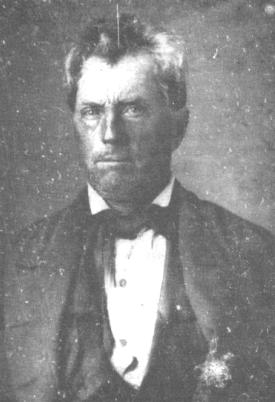  
Don Carlos Barrett, Edward Burleson (left), Robert M. Coleman (center), James S. Lester, Barthalomew Manlove, Bartlett Sims, Robert M. Williamson (right)
Brazoria/Columbia
  
Branch T. Archer (left),
Warren D.C. Hall, Henry Smith (second), Edwin
Waller (third),
John S. D. Byrom, John A. Wharton (below left), William H. Wharton (below right)
 
Colorado (Alfred)
Jesse Burnham
Goliad
James Grant, Peter W. Grayson, Benjamin F. Smith, Thomas G. Western, Ira J. Westover
Gonzales

William W. Arrington,
Joseph D. Clements, George W. Davis (photo), William S. Fisher, Benjamin
Fuqua, James Hodges, Thomas R. Miller
Harrisburg
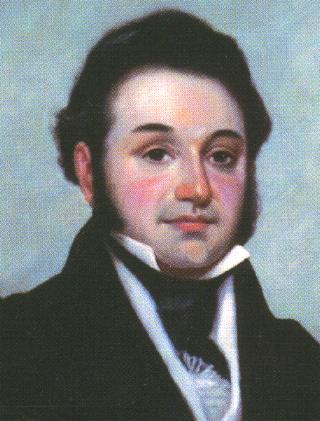
Clement C. Dyer, William P. Harris, David B. Macomb, John W. Moore, George M. Patrick,
Merriwether W. Smith, Lorenzo de Zavala (photo)
Jackson
James Kerr
Jasper (Bevil)
John R. Bevil, James H. Blount, Stephen H. Everitt, Wyatt Hanks, Thomas Holmes, John
A. Veatch
Jefferson
G. A. Patillo, Claiborne West
Liberty
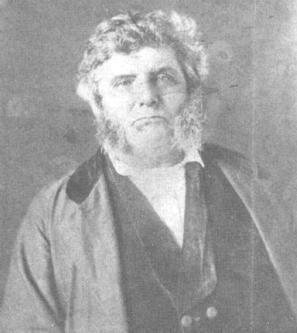
David G. Burnet (photo),
Augustine B. Hardin, William P. Harris, Hugh B. Johnston, Henry Millard, George M.
Patrick, Claiborne West, James B. Woods
Matagorda
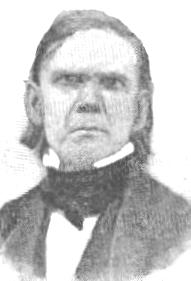 
James Kerr (photo
left), Ira R. Lewis (photo
right), John D. Newell, Richard R. Royall, George
Sutherland, Francis M. White, Charles Willson
Milam (Viesca)

Samuel T. Allen, Joseph L. Hood, James W. Parker, Albert G. Perry (photo), John G. W. Pierson, Alexander
Thompson
Nacogdoches
 
David A. Hoffman, Sam Houston, Daniel Parker, Nathaniel Robbins, James W. Robinson (photo left), Thomas
J. Rusk (photo right),
William Whitaker
Refugio
Hugh M. Frazer, John Malone, James Power
Sabine
John S. Lane
San Augustine
  
Henry W. Augustin, Jacob Garrett, Alexander Horton
(photo left), Sam Houston (photo middle), Almanzon Huston, Achilles
Edwin Childs Johnson (photo right), Albert G. Kellogg, William N. Sigler
San Felipe de Austin
  
Stephen F. Austin (left),
Thomas Barnett, Jesse Burnham, Randall Jones (center), Wyley Martin, William
Menefee (right),
William B. Travis (below)

San Patricio
Lewis Ayers, John W. Bower, John McMullen
Shelby (Teneha)
Martin Parmer, James B. Tucker, John A. Veach
Victoria
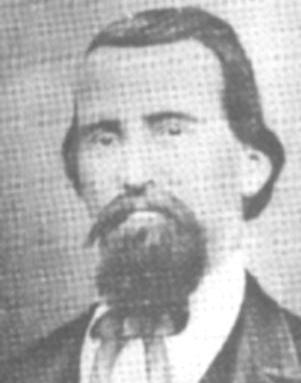 
Sylvestre DeLeon (photo
left), John J. Linn (photo
right), Juan A. Padilla
Washington

Phillip Coe, Elijah Collard, Jesse Grimes (photo), Asa Hoxey, William T. Millican,
Asa Mitchell, William M. Shepherd
--DeWitt Colonists/Residents in Italics-- |
The Agenda. Dr.
Branch T. Archer was elected president and Peter B. Dexter was elected secretary. Dr.
Archer outlined the work ahead:
Gentlemen: I return to you my thanks for the honor you
have conferred upon me. The duties which. devolve upon the members of this body are
arduous and highly important. In fact the destinies of Texas are placed in your hands and
I hope, that you are now assembled, you are in every way prepared to discharge those
duties in a manner creditable to yourselves and beneficial to your country. I call upon
you, each and all, to divest yourself of all party feelings, to discard every selfish
motive, and look alone to the true interests of your country. In the words of the Hebrew
prophet I would say, "Put off your shoes, for the ground upon which you
stand is holy. The rights and liberties of thousands of freemen are in your hands, and
millions yet unborn may be effected by your decision."
The First measure that
will be brought before the house will be a declaration in which we will set forth to the
world the causes which have impelled its to take up arms, and the objects for which we
fight.
Secondly, I will
suggest for your consideration the propriety of establishing a provisional Government, the
election of a Governor, Lieutenant-Governor and Council, and I would recommend that these
officers be clothed with both legislative and executive powers. This measure I conceive
absolutely necessary to prevent Texas from falling into the labyrinth of anarchy.
Thirdly, the
organization of the militia requires your immediate attention. You will have an army in
the field whose achievements have already shed luster upon our arms; they have not the
provisions and comforts necessary to continue their service in the field. Give them the
character, or their victories, though they are achieved not without danger and glory,
will, nevertheless, be unproductive of good. Sustain and support them, and they will do
honor to you and render incalculable service to their country. But neglect them---Texas is
lost. The adoption of a code of military laws is indispensable. Without discipline and
order in the ranks, your armies will be mobs, more dangerous to themselves than to their
adversaries, and liable at all times to be cut to pieces by a handful of regulars. I know
the men that are now in the field---there never were better materials for soldiers; but
without discipline, they can achieve nothing. Establish military laws, and, like the
dragon's teeth sown by Cadmus, they will produce armed men. It will be necessary to
procure funds, in order to prepare the contemplated government, and to carry oil the war
in which we are now engaged. It will, therefore, be our duty to elect agents to procure
these funds. I have too high an opinion of the plain, practical sense of the members of
this body to think for a moment that they will elect any but some of our most influential
citizens to this important post. Without funds, however heroically your armies may fight,
however wisely your councils may legislate, they will erect but a baseless fabric that
will fall by its own weight.
There are several
warlike and peaceful tribes of Indians that claim certain portions of our land. Locations
have been made within the limits they claim, which has created great dissatisfaction
amongst them. Some of the chiefs of those tribes are expected here in a few days, and I
deem it expedient to make some equitable, arrangement of the matter that will prove
satisfactory to them.
Permit me to call your
attention to another subject. Some of our brethren of the United States of the north,
hearing of our difficulties, have generously come to our aid; many more, ere long, will be
with us; services such as they will render should never be forgotten. It will be proper
for this convention to secure to them the rights and privileges of citizens---to secure to
them their lands in "headright," and place them on the same footing
with those of our citizens who have not yet obtained from the government their lands---and
in all other respects, to place them on equal footing with our most favored citizens.
Again, the path of promotion must be open. They must know that deeds of chivalry and
heroism will meet their reward, and that you will throw no obstruction in their pathway to
fame.
Some fraudulent sales
or grants of land, by the late government of Coahuila and Texas, will require your
attention. The establishment of mails, and an express department, is deemed necessary to
promote the interests of the country, besides other minor matters that have escaped my
observation in this cursory review.
Finally, gentlemen and
friends, let me call your attention from these details to the higher position which you
now occupy. Let me remind you that the eyes of the world are upon you; that battling as we
are, against the despotism of a military chieftain, all true republicans, all friends of
the liberties of man, are anxious spectators of the conflict, or deeply enlisted in the
cause. Let us give evidence that we are true descendants of that band of heroes who
sustained eight years' war against tyranny and oppression and gave liberty to a new world.
Let our achievements be such that our mother country, when she reads the bright page that
records them, shall proudly and joyfully exclaim: "These are my sons;
their heroic deeds mark them as such!" Again, gentlemen, let me
admonish you, that the ground upon which you stand is holy; that your decisions will
affect the rights and liberties of thousands of freemen, the destinies of millions yet
unborn, and perhaps the cause of liberty itself. I do not view the cause in which we are
now engaged as that of freemen fighting alone against military despotism; I do not view it
as Texas battling alone for her rights and her liberties; I view it in a nobler, more
exalted light; I view it as the great work of laying the cornerstone of liberty in the
great Mexican Republic. |
Unlike the two previous consultations, this convention was clearly an
independence assembly moving toward armed rebellion. There was no petitions to the Mexican
government and no pledges of loyalty to the government. However, the aim was stated by
B.T. Archer, to "lay the cornerstone of liberty in the great Mexican
Republic." A vote of delegates indicated that the tone of the reports
from the meeting were to be the establishment of a Provisional State Government (33 voting
For), not an Independent Nation (15 voting For). A committee of one delegate from each of
the twelve municipalities prepared a declaration outlining the forces that "impel
us to take up arms, and the objects for which we fight."
The
Declaration. On the committee was John. A. Wharton, William Menefee,
Lorenzo de Zavala, R. R. Royall, Asa Mitchell, W.
S. Fisher, R. K Williamson, Sam Houston, Almanzon Houston, Wyatt Banks,
Henry Millard and Samuel T. Allen. Committee deliberations resulted in the following
declaration:
Whereas, General Lopez de Santa Anna and other
military chieftains have, by force of arms, overthrown the federal institutions of Mexico
and dissolved the social compact which existed between Texas and other members of the
Mexican confederacy; now the good people of Texas, availing themselves of their natural
rights,
SOLEMNLY DECLARE:
1st. That they have
taken up arms in defense of their rights and liberties which were threatened by the
encroachments of military despots, and in defense of the republican principles of the
Federal constitution of Mexico of 1824.
2nd. That Texas is no
longer morally or civilly bound by the compact of union; yet, stimulated by the generosity
and sympathy common to a free people, they offer their support and assistance to such of
the Mexican confederacy as will take take up arms against military despotism.
3rd. That they do not
acknowledge that the present authorities of the nominal Mexican republic have the right to
govern within the limits of Texas.
4th. That they will not
cease to carry on war against said authorities whilst their troops are within the limits
of Texas.
5th. That they hold it
to be their right, during the disorganization of the federal system and the reign of
despotism, to withdraw from the union, to establish an independent government, or to adopt
such measures as they may deem best calculated to protect their rights and liberties; but
that they will continue faithful to the Mexican government so long as that nation is
governed by the constitution and laws that were formed for the government of the political
association.
6th. That Texas is
responsible for the expenses of her armies now in the field.
7th. That the public
faith of Texas is pledged for the payment of any debts contracted by her agents.
8th. That she will
reward with donations in lands, all who volunteer their services in her present struggle,
and receive them as citizens.
These declarations we solemnly avow to the world and call God to
witness their truth and sincerity, and invoke defeat and disgrace upon our heads should we
prove guilty of duplicity.
The Provisional Government.
The declaration was signed by every member present. The plan for a provisional government
was developed by a committee of Henry Smith, Henry Millard, Randall Jones, Robert Wilson,
C. C. Dyer, Asa Hoxey, James S. Lester, William W. Arrington, J. W. Robinson, S. R.
Everett and A. Houston:
Article I.
That there shall be and is hereby created a Provisional Government for Texas, which shall
consist of a governor, a lieutenant-governor, and a council to be elected from this body,
one member from each municipality, by the majority of each separate delegation present;
and the governor and lieutenant-governor shall be elected by this body.
Article II. The lieutenant-governor shall be president of the council, and shall perform
the duties of governor in case of the death, absence or other inability of the governor,
during which time a president pro-tem shall be appointed to perform the duties of the
lieutenant-governor in council.
Article III. The duties of the general council shall be to devise ways and means---to advise
and assist the governor in the discharge of his functions; they shall pass no laws, except
such as in their opinion the emergency of the country requires, ever keeping in
view the army in the field, and the means necessary for its comfort and support, they
shall pursue the most effective and energetic measures to rid the country of her enemies
and place her in the best possible state of defense. Two-thirds of the members elect of
the general council shall form a quorum to do business; and in order that no vacancy shall
happen in the council, if any member, from death or other casualty, shall be incapacitated
to act, the governor shall immediately, on information thereof', notify the members
elected to fill vacancies; and, on his default, any member who has been elected to this
body from the same jurisdiction may take his seat. The governor and council shall be
authorized to contract for loans, not to exceed one million dollars, and to hypothecate
the public lands and pledge, the faith of the country for security of payment. That they
have the power to impose and regulate imposts and tonnage duties, and provide for their
collocation under such regulations as may be most expedient. They shall have power, and it
is hereby made the duty of the governor and council, to treat with the several tribes of
Indians concerning their land claims; and, if possible, to secure their friendship. They
shall establish post offices and post roads and regulate the rates of postage and appoint
a postmaster-general, who shall have competent powers for conducting this department of
the provisional government, under such rules and regulations as the governor and council
may prescribe. They shall have Power to grant pardons, remit fines, and to hear and judge
all cases usual in high courts of admiralty, agreeably to the law of nations. They shall
have power to appoint their own secretary and other officers of their own body; also that
they have the power to create and fill such offices as they may deem proper; provided,
nevertheless, that this power does not extend to officers heretofore rejected by this
house. That the governor and council have power to organize, reduce or increase the
regular forces as they may deem the emergencies of the country require.
Article IV. The
governor, for the time being and during the existence of the provisional government, shall
be clothed with full and ample executive powers, and shall be commander-in chief of the
army and navy, and of all the military forces of Texas by sea and land; and he shall have
full power by himself', by and with the consent of the council, and by his proper
commander, and other officers from time to time, to train, instruct, exercise and govern
the militia and navy; and for the special defense and safety of the country, to assemble
and put in warlike attitude the inhabitants thereof, and to lead and conduct them by their
proper officers; and with them to encounter, repel, resist and pursue by force of arms, as
well by sea as by land, within or without the limits of Texas; and also to destroy, if
necessary, and conquer, by all proper ways and enterprises and means whatever, all and
every such person or persons as shall at any time, in a hostile manner, attempt the
destruction of our liberties, or the invasion, detriment or annoyance of the country; and
by his proper officers use and exercise over the army and navy and the militia in the
actual service, the law martial, in times of war, invasion or rebellion, and to take or
surprise by all honorable ways and means consistent with the law of nations, all and every
such person or persons, with their ships, arms, ammunition and goods, as shall, in a
hostile manner, invade or attempt the. invading or annoying our adopted country. And that
the governor he clothed with all these and all other powers, which may be thought
necessary by the permanent council, calculated to aid and protect the country from her
enemies.
Article V. There shall
be constituted a provisional judiciary in each jurisdiction represented, or which shall be
represented in this house to consist of two judges, a first and second, the latter only to
act in the absence or inability of the first, and be nominated 1by the council and be
commissioned by the governor.
Article VI. Every judge
so nominated and commissioned shall have jurisdiction over all crimes and misdemeanors
recognized and known to the common law of England---he shall have power to grant writs of
habeas corpus in all cases known and practiced to and under the same laws; he shall have
power to grant of sequestration, attachments or arrest, in all cases established by the
civil code and code of practice of the State of Louisiana, to be regulated by the forms
thereof; shall possess full testamentary powers in all eases and shall also be made a
court of record for conveyances, which may be made in English and not on stamped paper,
and that stamped paper be, in all cases, dispensed with; and shall be the notary public of
their respective municipalities. All office fees shall be regulated by the governor and
the council; all other civil proceedings at law shall be suspended until the governor and
general council shall otherwise direct. Each municipality shall continue to elect a
sheriff, alcalde and officers of ayuntamientos.
Article VII. All trials
shall be by jury; and, in criminal cases, the proceedings shall be regulated upon the
principles of the common law of England; and the penalties prescribed by said laws, in
eases of conviction, shall be inflicted, unless the offender shall be pardoned, or fine
remitted; for which purpose a reasonable time shall be allowed to every convict to make
his application to the governor and council.
Article VIII. The
officers of the provisional government, except such as are elected by this house, or the
people, shall be appointed by the general council, and all officers shall be commissioned
by the governor.
Article IX. All
commissions to officers hsall be, "in the name of the people, free and
sovereign," and signed by the governor and secretary; and all pardons and remissions
of fines granted, shall be assigned in the same manner.
Article X. Every
officer and member of the provisional government before entering upon the duties of his
office, shall take and subscribe to the following oath of office: "I, A. B., do
solemnly swear (or affirm) that I will support the republican principles of the
Constitution of Mexico of 1824, and obey the declaration and ordinances of the
consultation of the chosen delegates of all Texas in general convention assembled, and the
decrees and ordinances of the Provisional Government; and I will faithfully perform and
execute the duties of my office agreeably to law, to the best of my abilities, so help me
God."
Article XI. On charges
and specifications being made against any officer of the provisional government for
malfeasance or misconduct in office, and presented to the governor and council to be
conducted before a fair and impartial trial shall be the general council; and if, in the
opinion of two-thirds of the members, cause sufficient be shown, he shall be dismissed
from office by the governor.
Article XII. The
governor and council shall organize and enter upon their duties immediately after the
adjournment of this house and hold their sessions at such times and places as in their
opinion will give the most energy and effect to the objects of the people, and to the
performance of the duties assigned to them.
Article XIII. The
general council shall appoint a treasurer, whose duties shall be clearly defined by them,
and who shall give approved security for their faithful performance.
Article XIV. That all
land commissioners, empresarios, surveyors or persons in anywise concerned in the location
of lands, be ordered forthwith to cease their operation during the agitated and unsettled
state of the country, and continue to desist from further locations until the land office
can be properly systematized by the proper authority, which may hereafter be established;
that fit and suitable persons be appointed to take charge of all the archives belonging to
the different land offices, and deposit the same in safe places, secure from the ravages
of fire, or the devastation of enemies---and that the persons so appointed be fully
authorized to carry the same into effect, and be required to take and sign triplicate
schedules of all the books, papers and documents found in the several land offices, one of
which shall be given to the governor and council, one left in the hands of the land
office, the other to be retained by the said person, and they are enjoined to hold such
papers and documents in safe custody subject only to order of the provisional government
or such competent authority as may be hereafter created; and the said persons shall be
three from each department as commissioners to be forthwith appointed by this House to
carry this resolution into full effect, and report thereon to the government and council,
and that the political chiefs immediately cease their functions. The different archives of
the different primary judge, alcaldes and other municipal officers of the various
jurisdictions, shall be turned over to their successors in office, immediately after their
election or appointment; and the archives of the several political chiefs of the
departments of Nacogdoches, Brazos and Bexar, shall be transmitted forthwith to the
governor and council for their disposition.
Article XV. All persons
now in Texas, and performing the duties of citizens, who have not acquired their quantum
of land, shall be entitled to the benefit of the law of colonization, under which they
immigrated, and all persons who may immigrate to Texas during her conflict for
constitutional liberty, and perform the duty of citizens, shall also receive the benefits
of the law under which they immigrated.
Article XVI. The
governor and council shall continue to exist as a provisional government until the
re-assembling of this consultation, or until other delegates are elected by the people and
another government established.
Article XVII. This
convention when it may think proper to adjourn, shall stand adjourned to meet at the town
of Washington, Texas, on the first day of March next, unless sooner called by tire
executive and council.
Article XVIII All
grants, sales and conveyances of land illegally and fraudulently made by the State of
Coahuila and Texas, located or to be located within the limits of Texas, are hereby
solemnly declared null and void and of no effect.
Article XIX. All
persons who leave the country in its present crisis, with a view to avoid a participation
in its present struggles, without permission from the Alcalde or judge of their
municipality, shall forfeit all or any lands they may hold or may have a claim to, for the
benefit of this government; provided, nevertheless, that widows and minors are not
included in this provision.
Article XX. All moneys
now due or that may hereafter become due, on lands lying with the limits of Texas, and all
public funds or revenues, shall be at the disposal of the governor and general council,
and the receipts of the treasurer shall be a sufficient voucher for any and all persons,
who may pay moneys into the treasury and the governor and council shall have power to
adopt a system of revenue to meet the exigencies of the State.
Article XXI. Ample
power and authority shall be delegated and are hereby given and delegated to the governor
and general council of the provisional government for all Texas, to carry go into full
effect the provisions and resolutions adopted by the consultation of the chosen delegates
of all Texas in general convention assembled, for the creation, establishment and
regulation of the said provisional government. |
ON THE MILITARY
Article 1. There
shall be a regular army created for the protection of Texas during the present war.
Article 2. The regular
army of Texas shall consist of one Major General, who shall be commander-in-chief of all
the forces both regulars and volunteers, called into public service during the war.
Article 3. The
commander-in-chief of the regular army of Texas shall be appointed by this convention
(consultation) and commissioned by the governor.
Article 4. He shall be
subject to the orders of the governor and council.
Article 5. His staff
shall consist of one adjutant general, one, quartermaster general, one paymaster general,
one surgeon general and four aides-de-camp, with their respective ranks as in the United
States army in time of war, to be appointed by the major general and commissioned by the
governor.
Article 6. The regular
army of Texas shall consist of men enlisted for two years, and of volunteers for and
during the continuance of the war.
Article 7. The regular
army of Texas, while in service, shall be governed by the rules, regulations and
discipline, in all respects , applicable to the regular army of the United States of
America in as far as is applicable to our conditions and circumstances
Article 8. The regular
army of Texas shall consist of eleven hundred and twenty men, rank and file.
Article 9. There shall
be a corps of Rangers under the command of a Major, to consist of one hundred and fifty
men, to be divided into three or more detachments, and which shall compose a battalion,
under the Commander-in-Chief when in the field.
Article 10. The Militia
of Texas shall be organised as follows: all able-bodied men over sixteen, and under fifty
years of age, shall be subject to militia duty.
Articles 11. Every
inhabitant of Texas coming within purview of the preceding article shall, on the third
Monday of December next, or as soon thereafter as practicable, assemble at each precinct
of their municipality, and proceed to elect one captain, one first lieutenant, and one
second lieutenant to every fifty-six men.
Article 12. When said
election shall have taken place, the judges shall certify to the Governor forthwith the
names of the respective officers elected, who shall, as soon as practicable, make out and
sign, and transmit commissions for the same; that if there shall be found to exist in any
municipality more than three companies, the Captains or Commandants, on giving due notice
thereof, shall call together the subalterns of said companies, and proceed to elect one
Major; if of four companies, one Lieutenant-Colonel; if of five or more companies, one
Colonel for the command of said companies, which shall constitute a regiment of said
municipality; that if there shall be found to exist more than one regiment in said
municipality, the whole number of field and company officers shall on due notice proceed
to elect a Brigadier-General out of their number, who shall command the whole Militia in
said municipality.
BRANCH TANNER ARCHER, President. |
This addenda was added on motion of John A. Wharton: "Resolved,
That the governor and council be empowered to issue writs of election to fill any
vacancies that may occur in this body, and for the representation of those jurisdictions
not yet represented or to cause a new election in toto for delegates to the convention of
the first of March next."
Provisional Governor Smith's
Inaugural Address. Under the rules, Henry Smith was elected governor and
James W. Robinson was elected lieutenant-governor. Sam Houston was elected major-general
and commander in chief of the Texas forces. Branch T. Archer, William Wharton and Stephen
F. Austin were appointed commissioners and agents to the United States of America.
Provisional Governor Smith appointed Dr. Charles B. Stewart Executive Secretary and P.B.
Dexter as Secretary of the Council and then delivered his first address to his government:
EXECUTIVE DEPARTMENT, SAN FELIPE,
November 15, 1835.
To the President and members of the Legislative Council of Texas:
Gentlemen-Called upon to discharge the duties of the Supreme Executive
of the free and sovereign State of Texas, I commence the task not without distrust of my
abilities, but relying chiefly upon your support, and the indulgence of an intelligent and
well disposed people, I am inspired with confidence and cheered by the hope that our
united efforts to promote the public good, will not prove unavailing.
I trust there is not one of your honorable body insensible to the many
dangers that threaten, surround and overhang our adopted country; that there is not one
who does not feel the great trust confided, and who is not aware of the heavy
responsibilities which necessarily devolve upon us. In the outset, in the very beginning,
ere one error is committed or an act performed, I call upon you to summon to your
assistance, moral courage; to throw around you the impenetrable shield of honesty; to
march onward in the pathway of duty, and undauntedly to meet the dangers and obstacles
which chance or design may throw in your way. If we cower or shrink beneath the task,
shame and disgrace await us, and ruin irretrievable to our adopted country. Contemplate
the task before you, the dangers to be encountered, and the obstacles to be removed or
surmounted, and decline the task, or make a beginning with a firm determination faithfully
and fearlessly to perform your duties.
I thus take the liberty to admonish you, because no common duties
devolve upon you. You have to call system from chaos; to start the wheels of government,
clogged and impeded as they are by conflicting interests, and by discordant materials.
Without funds, without the munitions of war, with an army in the field contending against
a powerful foe: these are the auspices under which we are forced to make a beginning.
Our country is now involved in war. Our foe is far superior to us in
numbers and resources. Yet when I consider the stern materials of which our army is
composed, the gallant and heroic men that are now in the field, I regard not the disparity
of numbers, but am satisfied that we could push our conquests to the walls of Mexico. I
earnestly recommend that you adopt the most prompt and energetic measures in behalf of the
army; that you forthwith provide all the necessary munitions of war, so that the army may
not be cramped or impeded by any remissness on the part of the government, and that you be
careful to select agents of known skill and science to purchase artillery and other
munitions.
Another important matter, will require your immediate attention. Our
frontier and seaport towns are unprotected and exposed to the mercy of the enemy. The
policy of having them well fortified must be obvious to all. I therefore recommend the
organization of a civil topographical engineer corps, and the commencement of the work of
fortification and defense without delay.
I recommend the granting of letters of marque and reprisal, by doing
which we can not only prevent invasion by sea, but we can blockade all the ports of Mexico
and destroy her commerce, and annoy and harass the enemy more in a few months than by many
years of war carried on within our own limits. My own mind is satisfied that the whole of
our maritime operations can be carried on by foreign capital and foreign enterprise.
Already applications f or commissions have been made; they are willing to take the hazard,
as such affords them every encouragement.
Provisions have already been made for the organization of a corps of
rangers, and I conceive it highly important that you should place a bold, energetic and
enterprising commander at their head. This corps, well managed, will prove a safeguard to
our hitherto unprotected frontier inhabitants and prevent the depredations of those savage
hordes that infest our borders. I conceive this very important at this moment, as it is
known that the Mexican authorities have endeavored to engage them in a war with us.
Volunteers from foreign countries are daily reaching our shores and
enlisting in our cause. These gallant and chivalrous men are actuated alone by the noblest
motives; no sordid or mercenary considerations have induced them to leave their homes and
share our fate. Let us then act with becoming generosity, and unasked, give valor its
reward. I recommend this not only that the world may know what are the inducements that
Texas holds forth to the brave and enterprising; but in order that it may be now settled
and not hereafter become the cause of dissatisfaction.
7. Some of our red brethren of the Cherokee, Shawnee and others of
their associate bands, are located on certain lands within our limits, to which it is
generally understood they have a just and equitable title. They have lately been
interrupted in their title by surveys and locations within the limits which they claim,
which has created among them great dissatisfaction. I therefore recommend that you second
the measures of the late convention in this matter and never desist until the objects
contemplated by that body be carried into effect.
8. I recommend the employing of agents for foreign countries; that they
be clothed with special powers, and that they be sent to different points, with a view of
procuring for Texas all the aid and assistance that a generous and sympathizing world will
bestow.
9. I would also recommend the establishment of a tariff, and the
appointment of revenue officers to collect imports and tonnage duties; also a collector
for the purpose of collecting all sums due the government on lands or other sources.
10. I would now call your attention to the post office department and
would recommend the appointment of a postmaster-general. The appointment made by the
previous council I highly approve, and trust under your care that this department will
flourish and extend its benefits to every section of the country. I further recommend an
express department to continue during the war.
11. No time should be lost in the organization of the militia, nor in
the local civil organization of the different jurisdictions of Texas in conformity with
the plan of the Provisional organization of the government.
12. You will find it necessary to appoint a treasurer, and perhaps
other officers which you may hereafter find requisite.
13. It will also become your duty to select some place as the seat of
government, at which to hold your regular sittings during the continuance of the present
form of government. In doing this you will throw aside all local partialities and
prejudices, and fix on that point possessing most advantages, and the best calculated to
forward our views, by giving promptness and energy to our united actions. I therefore deem
it unnecessary to make further suggestions on that subject, and will only add that a
council hall, together with other offices for the different departments of government, is
indispensable.
14. 1 have now, gentlemen, touched upon all the matters of importance
that have presented themselves to me.
Doubtless many have escaped my observation, which you will detect. I
will, from time to time, present such other matters for your consideration as may occur to
me. Again permit me to remind you of the necessity of acting with energy, boldness and
promptitude-that the welfare of thousands depends upon your actions. Your country
possesses immense resources if properly developed; it is for you to quicken and enliven
the body politic, and make Texas the Eden of America.
I conclude, gentlemen, by expressing the hope that the Supreme Ruler of
Nations will smile upon your council, and that by our united efforts, we will be enabled
to place Texas in a situation to become what the God of nature designed her to be, a land
of liberty and of laws-of agriculture and of commerce-the pride and support of our lives,
and a legacy of price unspeakable to posterity. HENRY SMITH |
 Henry Smith was the
youngest of ten children of the Reverend James and Magdalen Woods Smith who are buried in
Bryantsville, GarrardCo, Kentucky. His mother Magdalen Woods, at about age 10, was along
with her mother and sister Sally (m. Capt. James Newel of RockbridgeCo, VA) were kidnapped
by Indians in BotetourtCo, Virginia and after two years were ransomed by French traders.
Magdalen Woods married James Smith, a Baptist minister in WytheCo, VA and the family moved
to Kentucky about 1780 and settled at Smith’s Station (current Bryantsville). Rev.
Smith preached at the Forks of Dix River Church in GarrardCo, KY, the Bear Grass Baptist
Church in JeffersonCo, KY and in MonroeCo, Illinois where he is said to have performed the
first services in the area. Henry Smith was the
youngest of ten children of the Reverend James and Magdalen Woods Smith who are buried in
Bryantsville, GarrardCo, Kentucky. His mother Magdalen Woods, at about age 10, was along
with her mother and sister Sally (m. Capt. James Newel of RockbridgeCo, VA) were kidnapped
by Indians in BotetourtCo, Virginia and after two years were ransomed by French traders.
Magdalen Woods married James Smith, a Baptist minister in WytheCo, VA and the family moved
to Kentucky about 1780 and settled at Smith’s Station (current Bryantsville). Rev.
Smith preached at the Forks of Dix River Church in GarrardCo, KY, the Bear Grass Baptist
Church in JeffersonCo, KY and in MonroeCo, Illinois where he is said to have performed the
first services in the area.
Henry Smith was a merchant in Nashville, TN at age 21 and later at
Paint Lick, Kentucky where he married Harriet Gillette in 1815. Before 1820 he moved to
Boones LickCo, MO where his wife died leaving him with three sons, William, John Gillette
and James Evans. In Jan 1822, he married the sister of Harriet Gillette, Elizabeth
Gillette, who died in the cholera epidemic of 1833 in Brazoria, Texas. They had five
daughters, Harriet G., Jane, Sarah, Emily and Sophronia. In 1839 Henry Smith married for
the third time, Sarah Gillette, the sister of both former wives. They had a daughter,
Elizabeth, who died of yellow fever in Galveston in 1854. Sarah Gillette Smith died in
Liberty in 1863.
The Smiths came to Texas in 1827 and settled around Brazoria where he
was a farmer, school teacher and surveyor. He was severely wounded in the Battle of
Velasco in Jun 1832. At a meeting held to ratify the Turtle Bayou Resolutions, Smith
expressed his views suggesting that he supported separation of Texas from Mexico rather
than struggling for independence within the Republic under the Constitution of 1824. He
was alcalde of Brazoria in 1833 and delegate to the Consultation of 1833 at San Felipe. In
1834 he was appointed political chief of the Department of the Brazos by the governor of
Coahuila y Texas. He led the Independence Party which was for a declaration of
independence from Mexico at the Consultation of 1835 which instead still supported
restoration of the Federal Constitution of 1824. Smith refusal to compromise and lack of
diplomacy in dealing with his Provisional Council and various factions of the provisional
government as the first Anglo governor of Texas while still a part of the Republic of
Mexico nearly led to dissolution of the provisional government of Texas at a most critical
period. Smith attempted to dissolve the Council and the Council attempted to impeach the
governor. Smith was not a delegate at the subsequent Independence Convention at
Washington-on-the-Brazos in Mar 1836 and was not called on as a part of the ad interim
government that emerged from the meeting. William Fairfax Gray in his diary relates on 16
Feb 1836 in Washington:
Spent an hour or two with Governor Smith, who expatiated very freely on
Texian affairs, and particularly on the state of parties. Abused Austin; said he is
Mexican in his principles and policy, and that he ought to be hung! Thinks Austin was
opposed to the meeting of the consultative convention, and that the expedition vs. Bexar
was got up in order to defeat it, and attributes the foolish or wicked terms of the
capitulation to his policy. Blames Austin for the dissentions which have arisen between
him (Smith) and the Provisional Council. In short, Austin is, with him, the evil spirit
which has instigated all the mischief which afflicts the country, and is to be made the
scapegoat of all others' faults. Archer he thinks honest, but too philanthropic; he wishes
to carry the war to the walls of Mexico. Wharton he thinks is "ABOUT
RIGHT"---"Are you there, old truepenny?" (My impression of Governor Smith
is that he is a strongly prejudiced party man. Too illiterate, too little informed, and
not of the right calibre for the station he has been placed in. Organs of self esteem and
combativeness large; perceptive faculty good; intellectual small; little reflection or
imagination; no reverence. )
His name was put forth for President of the new republic, but he
deferred throwing his support behind Gen. Houston. Smith served as Secretary of the
Treasury under President Houston in his first term and served in the Texas Congress in
1840. In 1849 he participated in the California Gold Rush with apparently little success
in search of gold. He died in a mining camp in Los AngelesCo, CA 4 Mar 1851. Recollections
of Henry Smith which he called "The Stormy Days of 1836" concerning
events in that year leading to San Jacinto were recorded by newspaperman William P. Huff.
For Biographies, Search
Handbook of Texas Online
--DeWitt Colonists/Residents in Italics--
JUDICIAL APPOINTMENTS (JUDGES)
Bastrop
Sinclair Gervis, Thomas KinneyBexar
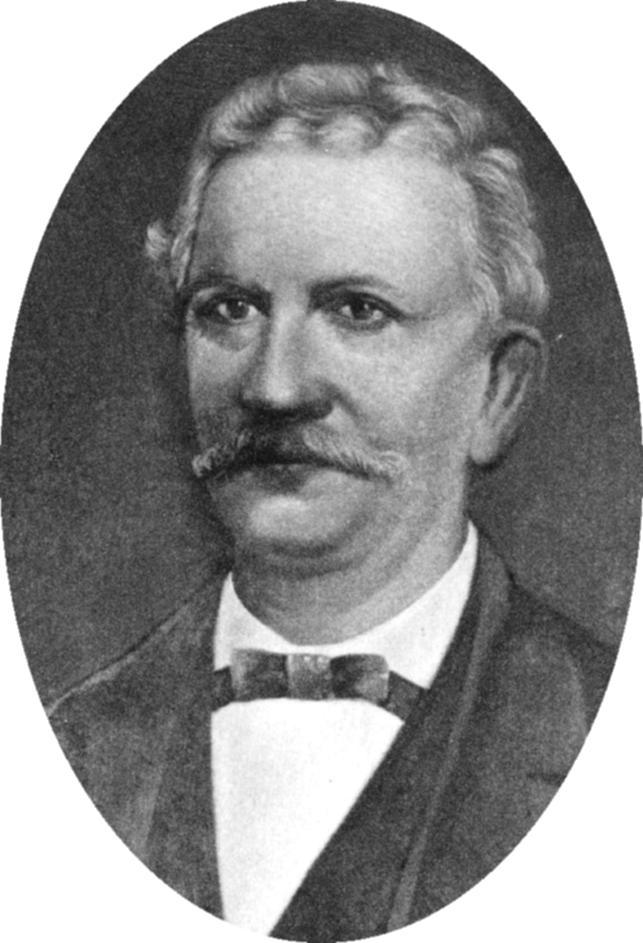
Miguel Arceniega, Juan N. Seguin (photo)
Brazoria
L. C. Mansen, Robert Mills
Goliad
Roberto Galan, Encarnacion Vasquez
Gonzales

Charles Lockhart, Andrew Ponton (photo)
Harrisburg
Hosea H. League, Nathaniel Lynch
Jasper
Joseph Matt , George W. Smyth
Matagorda
Thomas M. Duke, Charles Willson |
Nacogdoches

Radford Berry, John Forbes (photo)Refugio
Martin Lawler, Martin Power
San Augustine
John G. Love, W. N. Sigler
San Felipe

Gail Borden (above),
George Ewing
Shelby
James English, Emory Rains
Victoria
Placido Benavides, Francisco Cardenas
Washington
James Hall, Hugh McGiffen |
For Biographies, Search
Handbook of Texas Online
COMMISSIONERS FOR RAISING MILITIA
Bastrop
J. S. Lester, Reuben Hornsby, Samuel Wolfenberger Brazoria
John S. Bryom, James O'Conor, Mathew Patton
Goliad
Cabel Bennett, Ramon Falcon, Antonio Vasquez
Gonzales

William W. Arrington, Benjamin Fuqua, Andrew
Ponton (photo)
Harrisburg
James Cooper, William Little, William Scott
Jasper
John Bevil, X. B. Mudd, Isaac Wenfry
Jefferson
Richard Bellew, C. Chaplan, William T. Hatton, George A. Pattillo, Theran Strong
Milam
Silas M. Parker, J. G. W. Patterson, William Taylor
Liberty
Jesse Devore, Hugh B. Johnson, B. W. Hardin |
Matagorda

H.C. Cook, Jefferson George, Bailey Hardeman (photo)Nacogdoches
George Pollett, Arthur Henrie, Richard Sparks
Refugio
Elkanah Brush, Robert Carlisle, John Coglin
San Augustine
Samuel Davis, Daniel McDaniel, William Nash
Shelby
William English, Richard Haley, Jonas Harrison
San Felipe
Thomas Gay, John R. Jones, Eli Mercer
Victoria
Placido Benavides
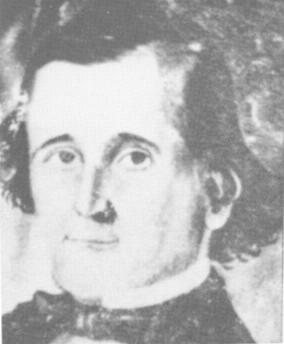
Josť Manuel J. Carbajal (above)

Sylvestre DeLeon
Washington
James J. Foster, John W. Hall, Asa Mitchell |
The provisional government provided for the organization
of the army in the form of a regiment of artillery and infantry, a regiment comprised of
two battalions of five companies each. It delineated the chain of command and officer
structure and elected officers. A ranger division was also organized.
For Biographies, Search
Handbook of Texas Online
OFFICERS OF THE REGULAR ARMY
| INFANTRY  Colonel Philip A. Sublett, then Edward Burleson (left) Colonel Philip A. Sublett, then Edward Burleson (left)
Lieutenant-Colonel Henry Millard
Major William Oldham
Captains
 
John Byrd, James Carter, Robert M. Coleman (left), George M. Collinsworth (right), John W. Martin, George F. Richardson, Ezekial Williams
First Lieutenants
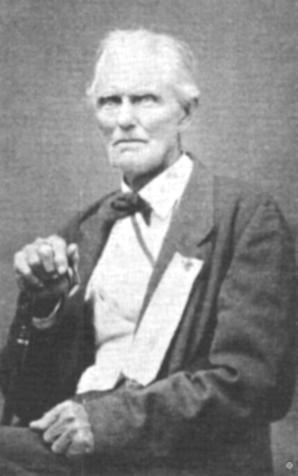 
John Bowman, George English, B. Franklin Hardin, L.H. McNeal, J. W. Shephard, William
H. Smith, Henry Teal, Amasa Turner (left), Robert Wilson, John York (right)
Second Lieutenants

Jefferson Allcorn, William Booth, Pleasant Bull, Milton Hardin, David L. Kokernot (above), R. H. Mabbitt, B. F. Sanders,
Benjamin C. Wallace, Madison Whitaker, McHenry Wilborne |
| ARTILLERY Colonel James
W. Fannin
Lt. Colonel David McComb, James C. Neill
Major William B. Travis (declined) (left), then Francis W. Johnson (right)
 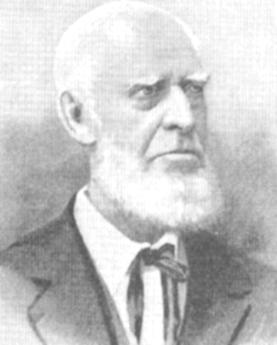
Captains
 
James Cheshire, James S. Lester, Pierre J. Menard (left), J. N. Moreland, Robert L. Morris, George W. Poe, John A. Veach, Robert
A. Veach, Joseph W. E. Wallace, Ira Westover, Samuel Williams (right)
First Lieutenants
John Chaffin, Almeron Dickinson,
Lucin W. Gates, John Henry, John D. McAllister
Second Lieutenants
James H. Blount, Joseph Cadle, Alexander Farmer, Robert H. Foot, C. R. Sharp
Third Lieutenants
Robert J. Calder, William Eaton, William Holman, W. C. Wilson |
CAVALRY
Major W. P. Miller
Captains
 
Harden Edward, John Forsyth, Juan N. Seguin (left), B. J.
White, Robert Wilson, John York (right)
First Lieutenants
Placido Benavides, William Bracken, Jonathan
Burleson, W. G. Hill, Allen Larrison, M. W. Smith
Second Lieutenants

Manuel J. Carbajal (above), J. Bevil Jr., James B. Bonham, James Drake, Joseph E. Scott, John M.
Thurston |
The council elected port tax and toll collectors for
Sabine, Samuel Rogers; Galveston, W.P. Harris; Brazoria, W. S. Fisher: Matagorda,
George M. Collingsworth: Copano. Edward Gritton; Lavaca, Lewis Ayers. A General Convention
was called to meet at Old Washington 1 Mar 1836.
SONS OF DEWITT
COLONY TEXAS
© 1997-2013, Wallace L. McKeehan, All Rights Reserved |







































